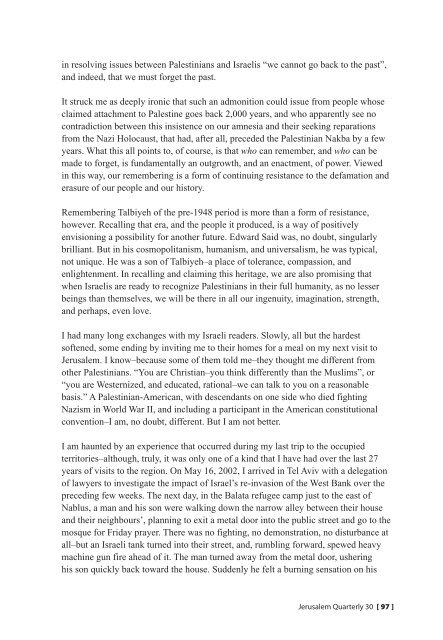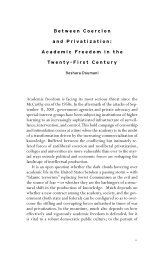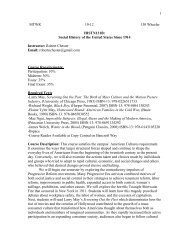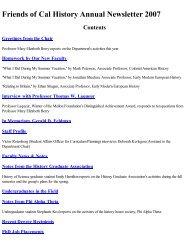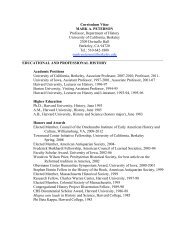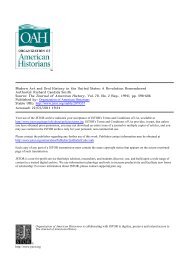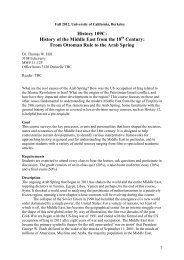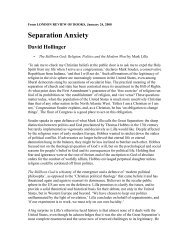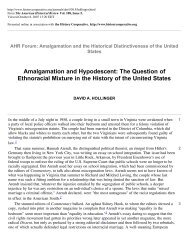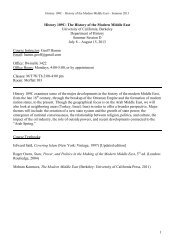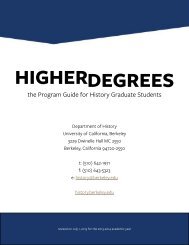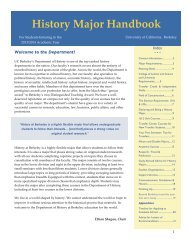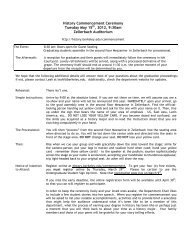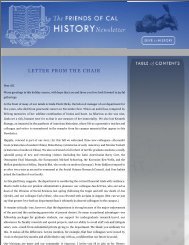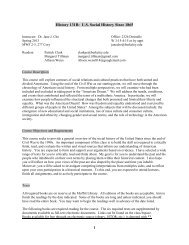My Grandmother and Other Stories: Histories of the Palestinians as ...
My Grandmother and Other Stories: Histories of the Palestinians as ...
My Grandmother and Other Stories: Histories of the Palestinians as ...
Create successful ePaper yourself
Turn your PDF publications into a flip-book with our unique Google optimized e-Paper software.
in resolving issues between <strong>Palestinians</strong> <strong>and</strong> Israelis “we cannot go back to <strong>the</strong> p<strong>as</strong>t”,<br />
<strong>and</strong> indeed, that we must forget <strong>the</strong> p<strong>as</strong>t.<br />
It struck me <strong>as</strong> deeply ironic that such an admonition could issue from people whose<br />
claimed attachment to Palestine goes back 2,000 years, <strong>and</strong> who apparently see no<br />
contradiction between this insistence on our amnesia <strong>and</strong> <strong>the</strong>ir seeking reparations<br />
from <strong>the</strong> Nazi Holocaust, that had, after all, preceded <strong>the</strong> Palestinian Nakba by a few<br />
years. What this all points to, <strong>of</strong> course, is that who can remember, <strong>and</strong> who can be<br />
made to forget, is fundamentally an outgrowth, <strong>and</strong> an enactment, <strong>of</strong> power. Viewed<br />
in this way, our remembering is a form <strong>of</strong> continuing resistance to <strong>the</strong> defamation <strong>and</strong><br />
er<strong>as</strong>ure <strong>of</strong> our people <strong>and</strong> our history.<br />
Remembering Talbiyeh <strong>of</strong> <strong>the</strong> pre-1948 period is more than a form <strong>of</strong> resistance,<br />
however. Recalling that era, <strong>and</strong> <strong>the</strong> people it produced, is a way <strong>of</strong> positively<br />
envisioning a possibility for ano<strong>the</strong>r future. Edward Said w<strong>as</strong>, no doubt, singularly<br />
brilliant. But in his cosmopolitanism, humanism, <strong>and</strong> universalism, he w<strong>as</strong> typical,<br />
not unique. He w<strong>as</strong> a son <strong>of</strong> Talbiyeh–a place <strong>of</strong> tolerance, comp<strong>as</strong>sion, <strong>and</strong><br />
enlightenment. In recalling <strong>and</strong> claiming this heritage, we are also promising that<br />
when Israelis are ready to recognize <strong>Palestinians</strong> in <strong>the</strong>ir full humanity, <strong>as</strong> no lesser<br />
beings than <strong>the</strong>mselves, we will be <strong>the</strong>re in all our ingenuity, imagination, strength,<br />
<strong>and</strong> perhaps, even love.<br />
I had many long exchanges with my Israeli readers. Slowly, all but <strong>the</strong> hardest<br />
s<strong>of</strong>tened, some ending by inviting me to <strong>the</strong>ir homes for a meal on my next visit to<br />
Jerusalem. I know–because some <strong>of</strong> <strong>the</strong>m told me–<strong>the</strong>y thought me different from<br />
o<strong>the</strong>r <strong>Palestinians</strong>. “You are Christian–you think differently than <strong>the</strong> Muslims”, or<br />
“you are Westernized, <strong>and</strong> educated, rational–we can talk to you on a re<strong>as</strong>onable<br />
b<strong>as</strong>is.” A Palestinian-American, with descendants on one side who died fighting<br />
Nazism in World War II, <strong>and</strong> including a participant in <strong>the</strong> American constitutional<br />
convention–I am, no doubt, different. But I am not better.<br />
I am haunted by an experience that occurred during my l<strong>as</strong>t trip to <strong>the</strong> occupied<br />
territories–although, truly, it w<strong>as</strong> only one <strong>of</strong> a kind that I have had over <strong>the</strong> l<strong>as</strong>t 27<br />
years <strong>of</strong> visits to <strong>the</strong> region. On May 16, 2002, I arrived in Tel Aviv with a delegation<br />
<strong>of</strong> lawyers to investigate <strong>the</strong> impact <strong>of</strong> Israel’s re-inv<strong>as</strong>ion <strong>of</strong> <strong>the</strong> West Bank over <strong>the</strong><br />
preceding few weeks. The next day, in <strong>the</strong> Balata refugee camp just to <strong>the</strong> e<strong>as</strong>t <strong>of</strong><br />
Nablus, a man <strong>and</strong> his son were walking down <strong>the</strong> narrow alley between <strong>the</strong>ir house<br />
<strong>and</strong> <strong>the</strong>ir neighbours’, planning to exit a metal door into <strong>the</strong> public street <strong>and</strong> go to <strong>the</strong><br />
mosque for Friday prayer. There w<strong>as</strong> no fighting, no demonstration, no disturbance at<br />
all–but an Israeli tank turned into <strong>the</strong>ir street, <strong>and</strong>, rumbling forward, spewed heavy<br />
machine gun fire ahead <strong>of</strong> it. The man turned away from <strong>the</strong> metal door, ushering<br />
his son quickly back toward <strong>the</strong> house. Suddenly he felt a burning sensation on his<br />
Jerusalem Quarterly 30 [ 97 ]


